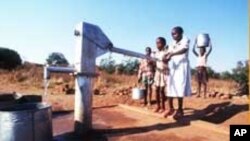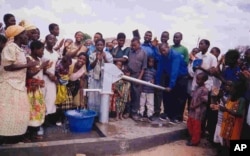Thousands of towns and villages throughout Southern Africa depend on groundwater; but they need more of it than they have.
The leaders of the Groundwater and Drought Management Project have an answer – teaching farmers and extension services new techniques for protecting it.
“Because of climate change issues and also because the available surface water is becoming depleted and (is) already committed, there is a need for [alternative sources of] groundwater," says Barbara Lopi, a spokeswoman for the effort.
Three countries in southern Africa have pilot projects to help turn the situation around: Zimbabwe, Botswana and Mozambique.
“These countries were selected because of the drought situation. The pilot projects are supposed to help communities to be able to mitigate the effects of drought using groundwater, since groundwater is a bit drought proof and can sustain communities during the period of drought if it can be well managed,” according to Barbara Lopi.
For Lopi, managing groundwater well means keeping it free of chemical pollutants like nitrates, which can poison drinking water. Some of the chemicals come from commercial fertilizers that drain deep into aquifers – a layer of rocky sediments beneath the soil that holds groundwater.
As part of the solution, the project teaches farmers to apply chemical fertilizers safely or use manure and other organic materials in their fields. They learn to preserve rainwater by making ridges around slopes. This allows water to sink into the ground, rather than run straight down a hillside, taking precious topsoil and minerals with it.
Project leaders also warn against drilling too many boreholes, or well, which has led to a drop in water levels in some places, including Lusaka, Zambia. Lopi says in Zimbabwe the project is focusing on rehabilitating broken boreholes.
The project is also helping improve the monitoring of groundwater.
Malawi’s government has allocated resources for monitoring in its 2009/2010 budget, which help identify new areas where boreholes can be created. Project managers say it's a small but necessary step to ensure that growing populations have access to water.






